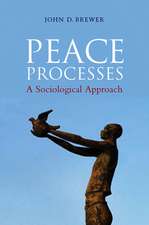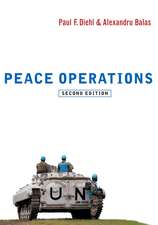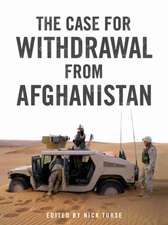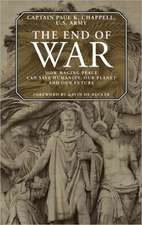Understanding Peacekeeping
Autor Professor Bellamy, Alex J., Paul Williams, Stuart Griffinen Limba Engleză Hardback – 11 ian 2004
Drawing on a wide range of historical and contemporary case studies, including: Afghanistan; Cambodia, Cyprus; the Democratic Republic of Congo; East Timor; El Salvador; Haiti, Liberia; Rwanda; Sierra Leone; Somalia; and the former Yugoslavia, this book develops an original conceptual framework to chart the evolution of the role of peacekeeping in global politics, and highlights the unique characteristics of different types of peacekeeping operations. Part 1 examines concepts and issues related to peacekeeping in global politics. Part 2 charts the historical development of peacekeeping from 1945 to the present. In Part 3, separate chapters are devoted to different types of peacekeeping operations: traditional peacekeeping; managing transition; wider peacekeeping; peace enforcement; and peace support operations. Part 4 looks forward and examines developments in global politics that are presenting serious challenges to the concept and practice of peacekeeping, namely, globalization, the privatization of security, preventing violent conflict, and the establishment of protectorates.
Understanding Peacekeeping will be essential reading for students and scholars of peace and conflict studies, security studies, and international relations.
Preț: 479.72 lei
Preț vechi: 592.25 lei
-19% Nou
91.82€ • 94.62$ • 77.52£
Carte tipărită la comandă
Livrare economică 03-17 martie
Specificații
ISBN-10: 074563057X
Pagini: 344
Dimensiuni: 164 x 239 x 30 mm
Greutate: 0.63 kg
Editura: Polity Press
Locul publicării:Chichester, United Kingdom
Public țintă
Undergraduate and postgraduate students of International Relations/Studies, Peace and Conflict Studies, Peace Studies, Conflict Resolution in the US, UK and Australasia.Descriere
Drawing on a wide range of historical and contemporary case studies, including: Afghanistan; Cambodia, Cyprus; the Democratic Republic of Congo; East Timor; El Salvador; Haiti, Liberia; Rwanda; Sierra Leone; Somalia; and the former Yugoslavia, this book develops an original conceptual framework to chart the evolution of the role of peacekeeping in global politics, and highlights the unique characteristics of different types of peacekeeping operations. Part 1 examines concepts and issues related to peacekeeping in global politics. Part 2 charts the historical development of peacekeeping from 1945 to the present. In Part 3, separate chapters are devoted to different types of peacekeeping operations: traditional peacekeeping; managing transition; wider peacekeeping; peace enforcement; and peace support operations. Part 4 looks forward and examines developments in global politics that are presenting serious challenges to the concept and practice of peacekeeping, namely, globalization, the privatization of security, preventing violent conflict, and the establishment of protectorates.
Understanding Peacekeeping will be essential reading for students and scholars of peace and conflict studies, security studies, and international relations.
Cuprins
Acknowledgements.
List of Abbreviations.
Introduction.
Part 1: Concepts and Issues.
1 Peacekeeping in Global Politics.
2 Who are the Peacekeepers?.
Part 2: Historical Development.
3 The Early Peacekeepers.
4 Peacekeeping After the Cold War.
Part 3: Types of Peacekeeping.
5 Traditional Peacekeeping.
6 Managing Transition.
7 Wider Peacekeeping.
8 Peace Enforcement.
9 Peace–Support Operations.
Part 4: Contemporary Challenges.
10 Globalization.
11 Subcontracting.
12 Transitional Administrations.
13 Preventing Violent Conflict.
Conclusion.
Appendix: UN Peacekeeping Operations.
Bibliography.
Index.
Recenzii
Paul F. Diehl, Choice
"Understanding Peacekeeping is very well suited as a core text for any course or module on peacekeeping because it evaluates the changing characteristics of the contemporary environment in which peacekeepers operate, what role peacekeeping plays in wider processes of global politics, the growing impact of non–state actors, and the major challenges facing peacekeepers in the future. It should be essential reading for all students and scholars of peace and conflict studies, security studies, and international relations".
Cedric de Coning, Conflict Trends
"Understanding Peacekeeping will make a fine textbook and reference work ... This is a thoroughly researched and well–presented book, which fills an important gap through its comprehensive analysis of peacekeeping and the clear link the authors establish between peacekeeping and wider trends in global politics."
Bastian Giegerich, Mediterranean Politics
"A valuable book. The authors have made an especially useful contribution in making understandable the extent and complexity of UN peacekeeping operations of all types in today′s global environment and in explaining just why these operations have sometimes succeeded and almost as often failed."
James S. Sutterlin, Political Science Quarterly
"One of the strengths of the book lies in its awareness that the conceptualization of peacekeeping, while important, will always run up against the messiness of actual experience ... a well–written, thoroughly prepared and convincingly argued book."
Norrie MacQueen, African Affairs
‘Students of Peacekeeping will welcome this book for its full and systematic coverage, combining detailed assessments of particular missions with a keen sense of the changing international context in which these took place’
Sir Lawrence Freeman, Professor of War Studies and Vice–Principal (Research), Kings College London
‘Understanding Peacekeeping provides a thorough and comprehensive overview of the origins and evolution of international peacekeeping, drawing on a wide range of contemporary examples. It will be an excellent resource, either as a reference book or for use in graduate level college courses.’
Professor David.F.Davis, Director, Peace Operations Policy Program, George Mason University
Notă biografică
Stuart Griffin is Lecturer in Defence Studies, King’s College London at the Joint Services Command and Staff College, UK.
Paul Williams is Lecturer in Security Studies at University of Birmingham, UK.
Textul de pe ultima copertă
Drawing on a wide range of historical and contemporary case studies, including: Afghanistan; Cambodia, Cyprus; the Democratic Republic of Congo; East Timor; El Salvador; Haiti, Liberia; Rwanda; Sierra Leone; Somalia; and the former Yugoslavia, this book develops an original conceptual framework to chart the evolution of the role of peacekeeping in global politics, and highlights the unique characteristics of different types of peacekeeping operations. Part 1 examines concepts and issues related to peacekeeping in global politics. Part 2 charts the historical development of peacekeeping from 1945 to the present. In Part 3, separate chapters are devoted to different types of peacekeeping operations: traditional peacekeeping; managing transition; wider peacekeeping; peace enforcement; and peace support operations. Part 4 looks forward and examines developments in global politics that are presenting serious challenges to the concept and practice of peacekeeping, namely, globalization, the privatization of security, preventing violent conflict, and the establishment of protectorates.
Understanding Peacekeeping will be essential reading for students and scholars of peace and conflict studies, security studies, and international relations.


















